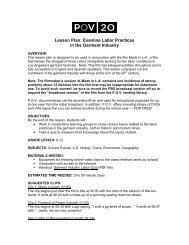economic empowerment - PBS
economic empowerment - PBS
economic empowerment - PBS
- No tags were found...
You also want an ePaper? Increase the reach of your titles
YUMPU automatically turns print PDFs into web optimized ePapers that Google loves.
“A community can never fly, a family cannever fly, if one of its wings is broken.”–Zainab Salbi, Founder of Women forWomen International University HospitalBenefits of EconomicEmpowermentA growing body of research shows that enhancing women’s <strong>economic</strong> opportunitiesplays a critical role in reducing poverty as well as gender-based discrimination and violence,improving women and girls’ access to education and civic participation, and raisingthe quality of life for future generations. When women are in charge of their financial destinies,income, and capital – such as land and livestock – they gain more control over theirown lives and personal security and as a result have greater access to decision-makingand leadership roles in their homes and communities. Women are also consistently morelikely to reinvest profits back into their families, which — in addition to improving their ownchildren’s nutrition, health, and education – contributes to the <strong>economic</strong> growth and securityof their communities and countries.Barriers to Women’s Economic Security• Financial dependence. Women who are denied the opportunity to earn and control theirown income and participate in important decisions regarding their personal finances andthe <strong>economic</strong> security of their families are at greater risk of poverty and domestic violenceand are more vulnerable to reproductive and maternal health challenges.• Limited participation in the workforce. Worldwide, women are more likely to be relegatedto work in the informal sector (such as domestic services and child care) wherewages are unregulated and workers lack basic rights and job security. Women who workin the formal sector are more likely to experience discrimination and occupy fewer leadershipand decision-making positions than their male co-workers.• Unequal pay. Despite doing the majority of the world’s work, women earn on averagebetween 10 and 30 percent less than men. According to a 2009 report by the U.S.Census Bureau, women who work full-time, year-round earn on average 23 percent lessthan men who work comparable hours.• Child care. Traditional gender roles limit women’s ability to participate equally with menat work and also limit men’s responsibility for child care and unpaid work duties.• Access to land. Women’s ability to own and inherit land is limited or denied in manycountries as a result of social and cultural traditions, legal restrictions, and the lack ofinformation and education available to women.Discussion guide // <strong>economic</strong> <strong>empowerment</strong>12
















